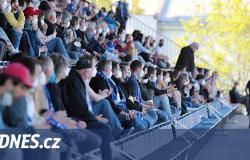Czech pharmacist Stanislav Havlíček spent four weeks in the war-torn Gaza Strip. Last week he returned from the humanitarian zone in the coastal area of Al-Mawasi near the Rafah crossing on the border with Egypt, where he worked for the humanitarian organization Médecins Sans Frontières.
“Every park, every free space is so occupied by simple tents. Wherever there used to be a multi-lane road, today there is only a single-lane road. From the other half, it was filled with endless rows of dwellings,” describes the reality of the city in the southern part of the area. Most of the more than two million inhabitants of the Gaza Strip moved there after an Israeli attack in response to a terrorist attack by the Hamas movement on Israel.
The situation will not just get better, on the contrary. Israel is about to go on the offensive there as well. Civilians are already living in catastrophic conditions – without functioning shops or schools, and above all without enough food and water. As early as May, most people in the Gaza Strip are at risk of starvation, the UN warned this week.
“I think that if people saw what I saw, even if I can understand the way (in which the Israeli army decided to retaliate, ed.) the scale is incomprehensible and inexcusable for me personally. I thought that democratic states abandoned the principle of collective guilt a long time ago,” says Havlíček.
In the first part of the interview for Seznam Zprávy, he describes what he experienced during four weeks in Gaza. He talks about starving children and the most difficult experiences from the place.
You returned from the southern part of the Gaza Strip last week. What did you see there in four weeks?
What I heard was more fundamental. What is written into your perception, like background noises. We had surveillance drones flying over our heads pretty much non-stop. Although they were rarely seen, they were always heard. Sometimes two or three flew by.
Day and night you can hear bombardments, tank shots or the impact of air missiles. Shelling from patrol boats could also be heard every morning. That was our morning wake-up call. The patrols tried to return the isolated fishermen who went out to sea back to the coast with targeted or warning fire.
In addition to all this, occasional fire from small arms. On the most intense days, she could be heard less than two kilometers from us, my colleagues said.
Photo: from the MSF archive.
“I worked as a pharmacist and pharmacy manager. We supplied two clinics where primarily primary care was dealt with – examination by general practitioners, paediatrics, gynecology or minor surgery,” explains Stanislav Havlíček for SZ.
And now for what you had the chance to see?
When we entered Gaza, one of the first sights was a parked van that had probably broken down, and a group of people taking away what it was carrying – mattresses. Our driver also showed us collapsed houses that were still standing a few days ago. There are a lot of houses like that.
For example, one morning last week I came across a huge dump between two apartment buildings with satellites sticking out at a ridiculous angle. I figured they surely couldn’t pick up any signal. Only then did I realize that I was looking at a house of which only gravel remained and the antennas that were located on the roof.
Around 200,000 people lived in Rafah before the war, today 1.7 million live there. Every park, every open space is thus occupied by simple tents. Wherever there used to be a multi-lane road, today there is only a single-lane road. From the other half, it was filled with endless rows of dwellings. There are a lot of children and sand everywhere because we are on the coast, which complicates transportation.
Photo: Abed Rahim Khatib / Anadolu, Profimedia.cz
There is a lack of fuel, and when it is, it is expensive. There is a lack of water because there are few deep wells for fresh water and at the same time the pumps for water from deep wells are also not working. Similarly, utility water. This is prescribed in terms of hygiene and how people look. Children are dirty and skin infections are spreading. The health condition of the people is also worsened by the fact that they have been living in tents for months and now it is the winter season when it practically still rained.
There is also no waste management. Landfills are growing in the neighborhood of the tents, which represents another health risk. It’s a drop back several decades or hundreds of years.
The UN issued a warning on Monday of a possible outbreak of famine in northern Gaza, where the lack of humanitarian aid is most acute. However, the food crisis has been raging throughout the territory for months. How was the situation?
Yes, the situation is worst in the north, but things are not rosy in Rafah either. Food is sold somewhere. For example, I saw huge queues at about two bakeries and also people baking pancakes in improvised ovens on the street and heating with paper cardboard. So sometimes there are resources. But there are not enough of them. I will describe it to you on our patients.
Based on our screenings (healthcare workers determine whether children are malnourished from the circumference of the arm, editor’s note) from January and the beginning of February, we recorded one or two malnourished children per week. When I arrived, it was suddenly one child a day, the next week even two. On the day I left, we had eight cases.
When I arrived, we were giving therapeutic nutrition to about 20 children. Over time, 47 of them were registered. Generally, 10 percent of these cases end up in a serious condition with complications. Children need to be hospitalized because they lose their appetite, are unable to swallow and are so apathetic that they cannot eat.
Gaza on the brink of famine
In the Gaza Strip, what the world last remembers from South Sudan or Somalia could happen within a few weeks. Famine may threaten up to 1.1 million people, according to the UN. But Palestinians, including children, are already dying of hunger.

What was your typical day at work like?
From our house, where 11 of us lived, we went to the pharmacy every morning, which was of course a tent. My colleagues dropped me off there and I spent the whole day dealing with supplies in the pharmacy, or I moved on foot to one of our polyclinics – to the tent next door.
About twice a week I went to the other two health centers that we supplied. On the way back, my colleagues picked me up, and in the evening I handled administration on the computer. For safety reasons, we could only move by car.
In the course of your work, have you met anyone who belonged to the Hamas movement?
Not with anyone. We are communicating with the Ministry of Health there. Whether or not they are members of the Hamas movement, I don’t know.
The armed conflict in the Gaza Strip has been going on for almost half a year. Civilians, including women and children, are dying, the territory is devastated and there is still little prospect of the situation improving. How did the locals affect you under such conditions?
They are grateful that we are here. They are aware of the contribution of MSF workers. And not only our patients. For example, when I was walking between the pharmacy and the polyclinic, people stopped me, thanked me and shook my hand.
My local colleagues displayed a tremendous degree of adaptability and psychological resilience to hardship. Despite the fact that, for example, one of my colleagues lived in a house with 60 relatives and many others survive in makeshift tents.
Most refugees do not go to work and live on savings or what they get. They lost a lot of things when they ran away, so they really live with the bare minimum. Nevertheless, they maintain a degree of oversight.
But it is important to realize that the life of the entire nation is in disarray and nothing works here. For example, children haven’t been to school for six months and won’t be for some time.
Did you have any hard times during those four weeks?
From previous missions, I already knew what it was like to see injured or malnourished children’s bodies. I was ready. But when I had the opportunity to see pictures of local children drawing and writing as part of psychological therapy to deal with the current situation, it got me. That’s something I don’t want to repeat. It was one of the worst moments of the mission for me, and I admire our psychologists.

Photo: From the personal archive of Stanislav Havlíček.
“When we return to the city one day, will there be a school, a mosque and a church?” is written on a child’s drawing from psychological therapy, taken by Stanislav Havlíček.

Photo: From the personal archive of Stanislav Havlíček.
“I don’t want blood or red anymore, let the religion of both sides be peace,” is written on the picture of a child from psychological therapy, taken by Stanislav Havlíček.
The next moment was when a house where our employees lived was hit by a tank around February 20. The mother and wife of one of our co-workers died because of it. His two sisters escaped with serious injuries.
Our colleague is a carpenter who, for example, made shelves from pallets for the pharmacy where I met him. He also helped us with moving heavy loads. So the hardest thing for me was when I met him at the pharmacy the next day after the incident. I didn’t know what to say.
Although it is only a fragment of the more than 30,000 people who died there, it concerned a specific person I know.
I will also remember that when I was leaving, I saw a children’s carousel where someone was spinning a couple of children. The same goes for the incredible amount of plastic kites that flew in the sky in Rafah, because it was the only toy and entertainment left for the children.
From the beginning, the Czech government has been firmly on the side of Israel, and the humanitarian crisis of Palestinian civilians remains rather a side of its interest. The same is the case with a significant part of the Czech public. You yourself saw the reality with your own eyes. How do you perceive it?
Probably not at all. I haven’t been on the internet or seen the news for a month now.
But I think that if people could see what I see, even if I can do it that way (how the Israeli army decided to respond, editor’s note) understand, so the scope is incomprehensible and inexcusable for me. I thought that democratic states abandoned the principle of collective guilt a long time ago.










